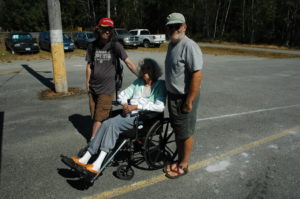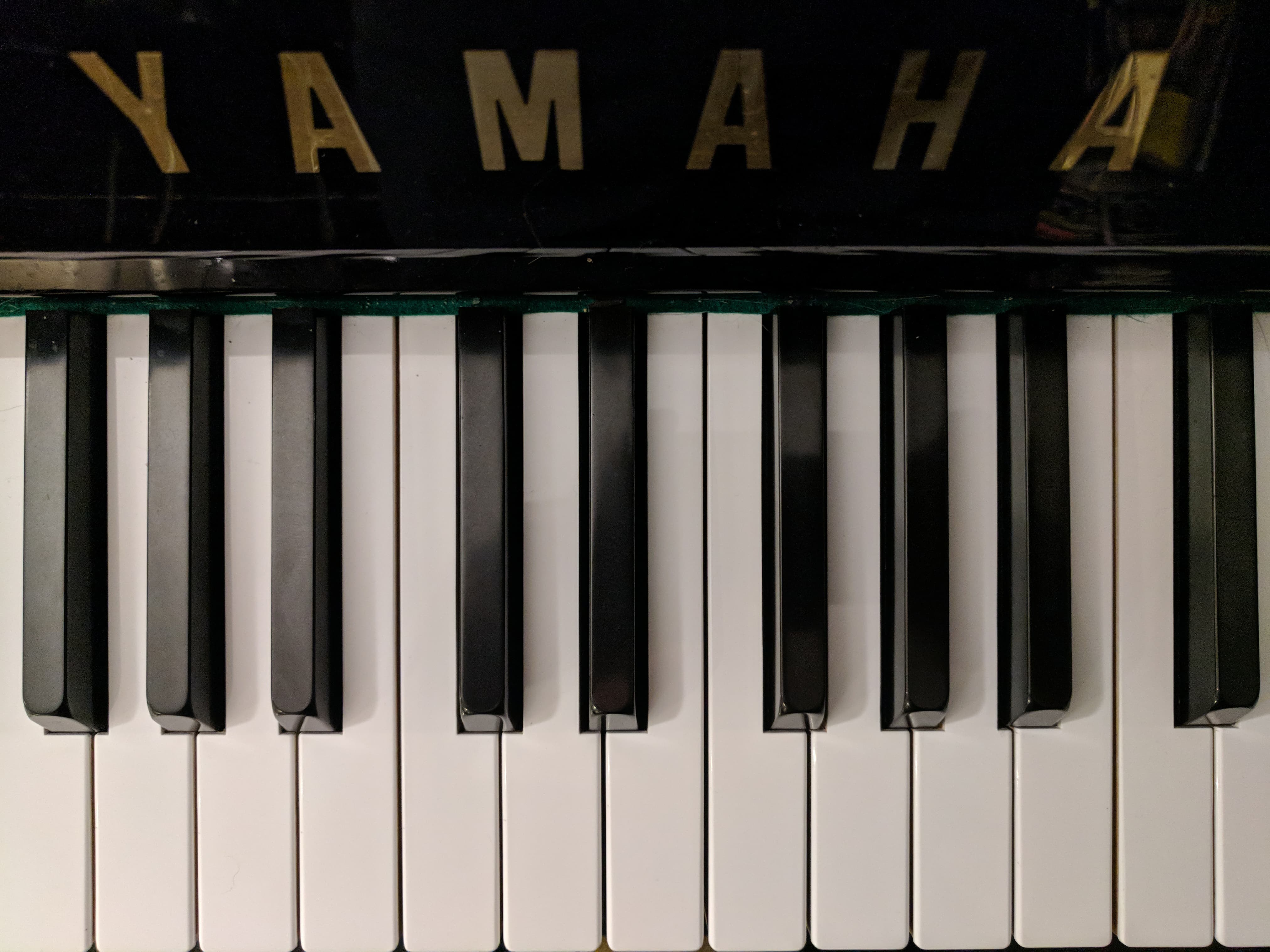
Donna and I are nearing four years of co-habitation, but aside from camping trips we have not been able to travel since Donna needed regular help and moved in with me. This last year I have made strides in self-confidence and ability to ‘deal’ with the various challenges of caregiving with Donna– and as such it was time to see if her stated desire to get out of the city for more than a night or two would translate into good things in actual practice.
Two of my good friends– Linda and my ‘tar sands mentor’ Petr Cizek live on Texada Island, where I have visited them twice before. At their invite, Mom and I made plans to head to see them and the lovely Gulf Islands of BC, where the types of natural beauty and quiet surroundings that have brought Mom peace in the past are abundant.
Traveling with someone with dementia is obviously not simple, but I took this as a challenge to see what we can do– and whether or not this is something that is actually good for Donna in the process.
When we have gone camping, I have noticed that after a day of it, she often gets a bit disoriented, and out of fear of her being basically ‘lost’ to herself, I made a shorter plan than I might have done so otherwise. Creating a place of recognizable “placement”– not getting a feeling of being exiled from reality was my primary concern. If an elder with dementia has their routine broken, things can very quickly become stressing in the extreme for them. For example, at home before bed we go through the exact same steps of getting ready for the slumber every night, right down to my words when Queuing this or that movement. Obviously a delirium or similar mental break down was (and is) of great concern to avoid.
Well, the way the trip began was instructive, and not disastrous, but it was highly stressful. We used the infamous Handydart System, as it can help you get to the Ferry from places throughout the GVRD, but my goodness what a scramble. For those not in Vancouver, let me explain it thus: First, a ride for an hour and a half on the little bus. Then a walk to a “Seabus,” a ride across the water, out of the Seabus and a wait for 40 minutes. Then another little bus for another 1.5 hours, ultimately dropping us off at the Ferry– which is a nightmare for a wheelchair to navigate.
We arrived at the Langdale terminal and were met by our friends shortly thereafter. Grabbing a couple of items along the way, we were set for mostly a straight drive back to the two ferries over to Texada Island, their home and a place for the next almost-week. Along the way Mom was exhausted, as was I– yet I didn’t notice it so much in myself. By the time Donna’s exhaustion got her to a “had it” place and snapping at me, I was tired enough to snap back. For a little while after this snarky caregiver and caregiven exchange, I seriously doubted whether or not this trip (or such travel in general) was going to be a disaster.
Once we arrived and had a nights sleep, we had a new day to get up to in beautiful (though smoky) weather on the largest Gulf Island. We went to visit Shelter Point– and similar to the day before, Mom was suddenly spent and refusing to get out of the truck, and I was flabbergasted and frustrated. Once I got her out of the truck, and we went along the shoreline to enjoy the beach area things improved– but only somewhat for the rest of this day.
There were times during the first couple of days where everything was “just fine” and Mom seemed quite content. She also was not that confused nor disoriented– she wasn’t asking me about “going back to our place” or similar things, which she would do, if lost.
But after our friends got me a bike to ride about in, even just a little around the village, and Mom and I went to relax in their large beautiful garden for awhile, Donna got up and began marching around to check out this and that of the various fruits and vegetables growing. She had not done this before on this trip– and she almost never does it during our “normal” days in town. She likes to explore and ignores back/hip pain to do so when she is off in the forests camping, or sometimes a little when we are in a natural setting like the great parks around the city. It’s a great indicator of her mood. I was able to stand up and “be the walker” holding her hands backwards until I simply needed to flee to the house to get her real walker– she was motivated, not turning around and wanting to keep up her exploration.
This kicked me into “Oh, YES!” mode, as this gleam of joy was what I had been waiting to see for the first couple of days. It was the spiritual reward of doing this for me, as it is something Mom couldn’t fake even if she managed the guile to attempt it.
Shortly after, when both of us were inside, Petr spoke about how glad he was to see *ME* acting “like myself” and suddenly being so buoyantly more happy and pleased to be there. He asked why, and though I had not even noticed that my own energy had turned around from exhausted and unhappy to very much content and laughing, I quickly was able to say “Because Mom just shot up. She was doing what she does when she is happy and enjoying real life things. I saw that and all this work was vindicated.”
Longer term, I realized it’s a dangerous thing that I was not even noticing the difference for me. I was going through the sensation of relief when Petr said I was “myself” for the first time that visit. I’m still a lot more stressed out most of the time (regardless of where or what we are doing) than I even notice. But Mom showing her appreciation of life there gave me more of my own.
Our final full day there Linda and Petr took us to a lovely Bay about a 25 minute drive from their home. Petr brought his kayak and I went out on the water with him, once we determined wind and sun patterns and found Mom (with a very ‘good with elders’ Linda) a comfortable place on the shoreline to watch the water come in, the birds (and planes) fly by, and more.
I thought getting into a kayak was a good idea, but it was a really great idea. Within two minutes of being on the oceans water, looking through the ripples from such a low vantage point, I was ten pounds lighter and my neck stopped grinding. We went out around various rock islands– first seeing a pair of seals just watching us from their rocky perch, then a sea otter (one of which I had not seen in the wild before) a couple of times, followed by an entire small society of seals when we traversed a slightly larger island on the edge of the Bay.
I found myself wanting to be doing that for several weeks, not mere hours. But getting that feeling inside me– while also visiting the remains of a hippie colony from the 70’s and 80’s– was more than enough to finish feeling quite grand.
Mom also did what Mom is so darn good at, and used the electric keyboard to play some of her favourite piano songs two nights in a row. In Gillies Bay the local deer wander through the village and by your fence eating discarded and/or rotten fruit. It made both Mom and I smile– and turned the tiny, beautiful but hesitant cat named Wilma into a hunter– who never quite took the full lunge. Wise decision, little one.
Our time had stresses the first two days that were above the norm, but as time passed it was a missed-yet-forseeable situation. Mom was bloody tired from the travel, as was I, and this plus discord was a recipe for cranky Donna and cranky Macdonald. On any further excursions into our future, I’d actually make the non-intuitive decision to go for a slightly longer jaunt, one where travel day and the following day are days where Mom is only expected to be helped to get the travel done and then to catch up on wiped out energies.
Mom got more and more chatty as we were on our longish day home, and though we had some serious pitfalls along the way (having to get off the Skytrain downtown with more things than two hands worth– and help with finding a public wheelchair restroom being the most dramatic), her energy and smile were up. Even as I became more and more tired it was a different approach– skipping stages of the travel home to rest for 30 minutes twice, for example– and this change made a major difference. There are many lessons, but the most important is one I already knew, but had to be replaced at the forefront of my mind: Just because you are not walking and are sitting in a wheelchair, doesn’t mean you don’t get exhausted from the travel.
Making going much slower, not trying to “catch this” or “run to that” was enough to believe I got it. This makes me feel quite dumb, as I realized more than 3 years ago that for our basic life, everything gets much, much better when racing around or trying to “make time” and rush with her is simply not allowed. Stupid me and two days of learning showed me this is MORE not less true of being outside of the home.
Since we returned Mom has made attempts to talk about the trip with others we have come in contact with, and smiles when I mention the trip we just had. It made it’s way into the deeper recesses of her mind and heart, another indicator.
What this means for her along with myself in the future is not even close to certain– but what I know is that my fear of this trip teaching me the hard way that “Donna may say she wants to travel, but it won’t work,” is NOT the case. So we have more possibilities opened up for us.
I’ll end with this:
In 2005 when Donna had an aneurysm, the doctors told me then she would need to be in an assisted-living nursing home for the rest of her life. In this society, too often just hearing a professional suggest it would be enough for that fate. That was in 2005. from 2007 to 2014 she managed independence, and from 2014 to now she has needed help but she has not given up on living– in mind or heart or soul.
2005-2018. All years that would have been staring at the wall and drooling on herself if the “normal way things are done” had been adhered to for Donna. Don’t congratulate me, nor tell Donna how lucky she is. Fight for the other million people soon to be given this same unneeded palliative care sentence.
Meanwhile, soon enough Donna and I will continue thinking about her future. One where life keeps happening, and judgements do not.
